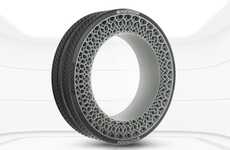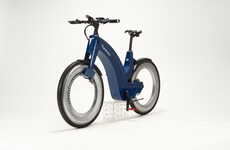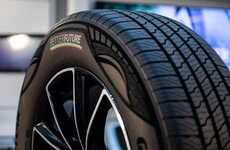
Bridgestone's Airless Tires Do Not Need to Be Inflated
Laura McQuarrie — April 18, 2017 — Autos
References: bridgestonetire & japantrends
Back in 2013, Bridgestone announced a concept for airless tires for cars called 'Air Free,' as part of a move towards emission reduction and greater use of sustainable materials. Now, Bridgestone has made the concept a reality for bicyclists.
The Air Free Concept introduces tires that do not need to be inflated with air to support weight. Rather than boasting a heavy design, these airless tires have a lightweight form that uses resins in the place of spokes and rubber.
Commercially, these new airless tires for bikes from Bridgestone are set to be on the market as of 2019, offering an easy way for the public to get around urban environments. Until then, these innovative tires from Bridgestone are being tested as part of a few special events in Japan.
The Air Free Concept introduces tires that do not need to be inflated with air to support weight. Rather than boasting a heavy design, these airless tires have a lightweight form that uses resins in the place of spokes and rubber.
Commercially, these new airless tires for bikes from Bridgestone are set to be on the market as of 2019, offering an easy way for the public to get around urban environments. Until then, these innovative tires from Bridgestone are being tested as part of a few special events in Japan.
Trend Themes
1. Airless Tires - Developing sustainable airless tires presents an opportunity for eco-friendly transportation options.
2. Lightweight Design - Creating lightweight airless tires can lead to improved performance and reduced fuel consumption in various industries.
3. Testing as Part of Special Events - Testing new products during special events can generate consumer interest and feedback for future innovation.
Industry Implications
1. Bicycle Industry - The airless tires can provide a low-maintenance solution for those who frequently ride bicycles as a transportation mode.
2. Automotive Industry - Adopting the airless tire technology for cars can improve safety, reduce the use of non-renewable materials, and lower manufacturing and maintenance costs.
3. Sports Equipment Industry - Lightweight and durable airless tires can offer sports enthusiasts a superior alternative to traditional rubber or plastic tires.
6.5
Score
Popularity
Activity
Freshness























